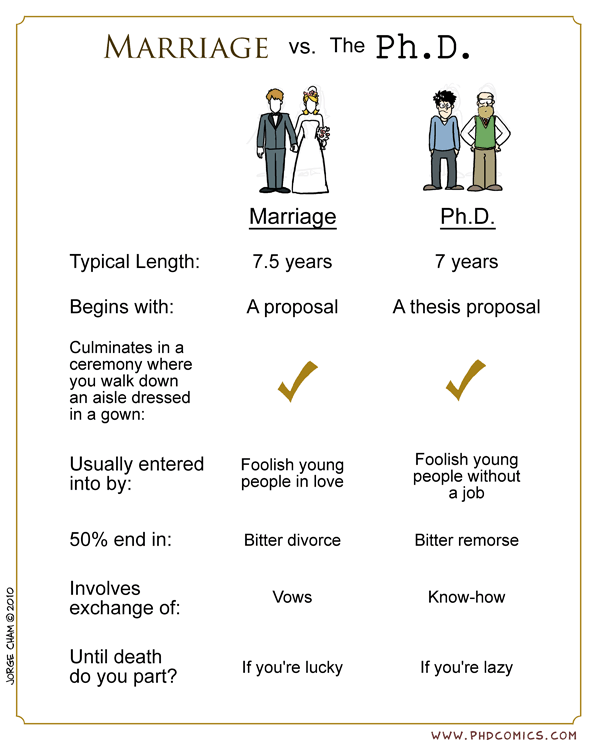
Undergraduate and Masters students often come to me for advice about how to find a PhD position. I know quite a few students read this blog so I thought I’d share the advice here. Hopefully some of it is helpful! Note this is aimed at people in the UK and Irish system who often go straight from undergraduate to a PhD (or do a brief one year Masters course in between the two). But many points are relevant to the US system too.
1) First make sure you definitely want to do a PhD!
This is really important and I think it’s something that very few of us ever bother to do. The thesis whisperer has some amazing advice on this, and many other subjects related to PhDs, so I won’t repeat too much here. (See http://thesiswhisperer.com/2011/11/07/should-i-do-a-phd/)
Doing a PhD can be an amazing experience, but it can also be extremely frustrating. Often it’s amazing and frustrating at the same time! You will work long hours for several years with very few rewards and low pay. Then once you finish your PhD things get even trickier – there’s no job security until you reach the Lecturer/Assistant Professor level which generally won’t happen until you’re at least 30, and getting that lecturer’s job is extremely difficult as there are far more qualified PhD students than there are postdoc jobs and lecturer jobs. So to succeed you need to work really hard and also have good luck. It’s good to aim high, but it’s also worth having an alternative career plan in mind for if the whole academia thing falls through. So before you start the long road of potential academic misery, make sure you have a really clear reason WHY you want to do a PhD. If it’s because you love research and can’t imagine doing anything else then great! If it’s because you need one for your chosen career (within or outside academia), again great! But if it’s because you don’t really know what else to do after graduating, or because you want to be a student for a few more years, then I’d recommend researching other options.
2) Advertised PhDs.
These PhDs generally already have funding and a planned research project. You just need to apply. Applications are usually fairly simple, just a CV and cover letter plus a couple of references (usually two). For the cover letter, make sure you describe exactly how you meet the criteria in the job description. Check out our earlier blog posts for help with CV writing. For referees try to include academic referees. Your project supervisor would be a good person to ask, followed by the head of department or your tutor. If the position is in aquatic ecology and you did particularly well in your aquatic ecology module you could ask the lecturer who taught you. Make sure you ask people before you put them down as references.
PhDs are advertised in many places including:
Twitter (with #phd or #jobs)
www.findaphd.com
ECOLOG Archives
Evoldir
University websites
Twitter can be particularly useful for this, as lecturers often tweet about positions in their lab and retweet adverts from other lecturers.
3) Non-advertised PhDs.
Not all PhD positions are advertised. Sometimes this is just because the person taking on students already has someone in mind or a good pool of undergraduate students to choose from. More often though this is because although the lecturer is perfectly happy to have a new PhD student they don’t have any funding. In these circumstances you need to apply for your own funding.
There are a couple of options when it comes to funding. The simplest are “personal” awards or studentships. These are PhD scholarships given to individual students based on various criteria – usually the quality of the student and of the proposed project. The other option is that a supervisor may include PhD student funding on a larger grant they are applying for. In this case the responsibility for the application rests with the supervisor. For personal awards the responsibility rests with you.
To apply for your own funding you first need to find a possible supervisor. You should already have an idea of the kind of project you’d like to work on, so you can use the internet to search for supervisors who might fit your interests. Ask around your current lecturers to see if they know of anyone suitable. You can narrow the search by also thinking about the place you’d like to study at. Once you’ve identified a possible supervisor, send them a brief email with your qualifications (attach your CV), what you’d like to work on, why you’d like to work with them and ask if there would be any opportunities in their group. Also mention that you’d be happy to apply for funding (if you have a funding body in mind mention this too). Don’t do this as a bulk email; make sure it’s tailored to the person in question. Also make sure it’s brief; most people today read emails on mobile phones so long emails are annoying.
If they say yes then you can work with them to prepare a proposal. Don’t get discouraged if you don’t get replies or if you get lots of negative replies. It’s not personal, it’s just that people are busy and some already have as many PhD students as they can handle!
One quick tip on choosing a supervisor (again thesiswhisperer has lots of advice for this): don’t just focus on the senior people. It’s exciting to work with a famous scientist, but more often than not they are extremely busy and their groups are hard to get into. More junior people are often given money for a PhD student or two when they start a new job. They also tend to have more time.
4) Where to apply for funding.
The best thing to do is to talk to your potential supervisor about funding options. There are fewer and fewer options these days but each university usually has some kind of scheme, and scholarly societies often give out scholarships. What you are eligible for will depend on the project, your nationality and the country you wish to do your PhD in. For example, EU citizens can get funding from Marie Curie/European Commission if you do a PhD outside of your home country (and in the EU). Students of any nationality can apply for funding from the Irish Research Council to do a PhD in Ireland. Students of any nationality can also apply for a Trinity Postgraduate Scholarship or Ussher Scholarship from Trinity College Dublin if they wish to study at TCD.
5) DO NOT accept a PhD with little or no funding.
Some people are so keen to do a PhD they’ll accept one with little or no funding. This is a terrible idea (unless you’re independently wealthy!). You will need to pay fees (at TCD these are currently nearly €6000 a year) and need money to live on. Many people try to manage this with a part time job, but if you’re working you’re not doing your PhD, which should be a full time job in itself. And remember for every extra year doing your PhD you need to pay fees. This doesn’t even consider where the money for lab materials, conference travel or equipment is going to come from. So make sure you check the status of the funding before you say yes!
6) Qualifications needed for PhD positions.
If you only have an undergraduate degree then you need a 2.1 or 1st class degree. Remember you’ll be competing with lots of people when you apply so this is just a guide. You can get a PhD with a 2.1 BUT if all the other applicants have 1st class degrees you will struggle. I personally would prefer a student with a 1st for their project and a 2.1 overall, to a student with a 2.1 for their project but a 1st overall.
If you have a Masters then you may get a PhD with a grade lower than a 2.1 but only if you got a good grade on your Masters (preferably a Distinction). Again, your mark for the project component is the most important.
If your qualifications are unusual make sure you explain them. Also make sure you explain them if you are applying to a foreign university which may use a different system. Percentage marks often help here. If you know where you ranked in your class include this information too. If applying for positions in the UK, Irish students should highlight the fact that Irish degrees are 4 years long thus almost the equivalent of a degree and a Masters in in UK.
7) Should I do a Masters or work experience?
Masters courses can be great but they are also expensive and may be of limited benefit in some cases. If you don’t feel ready for a PhD, or are unsure you want to commit to a PhD, a Masters may be more sensible than jumping straight in to a PhD. Also if your grades in undergrad were not very impressive, doing a Masters and getting a Distinction or Merit can override these issues. However, if you’re certain you want a PhD and your project and overall grades were good at undergrad there’s no reason you shouldn’t apply for PhDs straight away. One solution might be to apply for Masters courses and then pull out if you get a PhD (check your contract so you don’t end up losing any money). Masters in Research (MRes) courses may be a particularly good idea as they involve several research projects so allow you to decide if you really like research or not. MSc courses also include taught elements, so these are good if you want to learn more about a specialised topic. These also end with a long research project.
If you want to get a field or conservation based PhD, then work experience may be a better option than doing a Masters. This may still be expensive as most of these positions are unpaid, but then you have the option of volunteering for some of the time and then working to support yourself. Work experience can be Research Assistant positions at universities, internships at conservation charities etc. The Institute of Zoology take interns every year, as do the IUCN. There are field projects on meerkats and baboons run out of Cambridge University that take volunteers each year. Also search ECOLOG and EvolDir (see links in 2 above) for other field assistant positions. Alternatively, if you have a potential supervisor in mind you could email them and offer your services. Or offer to help at a local university so you can live at home and save money. Research Assistant jobs are a great way to learn about PhDs and research from PhD students and researchers you interact with, however, you have to be prepared to work independently as people often don’t have much time to supervise interns.
That’s my advice! Feel free to add alternative advice if you have any. And good luck finding a PhD!
Author
Natalie Cooper
nhcooper123
ncooper[at]tcd.ie
Photo credit
PhD comics












